人教版高二英语必修五Unit 4 Making the news Grammar(共22张PPT)
文档属性
| 名称 | 人教版高二英语必修五Unit 4 Making the news Grammar(共22张PPT) |

|
|
| 格式 | zip | ||
| 文件大小 | 1.4MB | ||
| 资源类型 | 教案 | ||
| 版本资源 | 人教版(新课程标准) | ||
| 科目 | 英语 | ||
| 更新时间 | 2020-08-11 10:48:07 | ||
图片预览

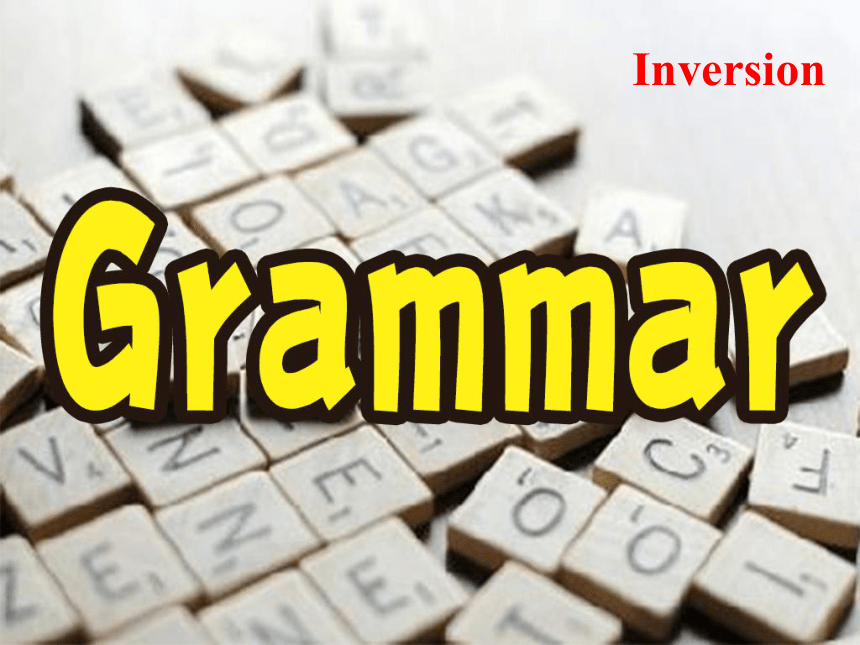
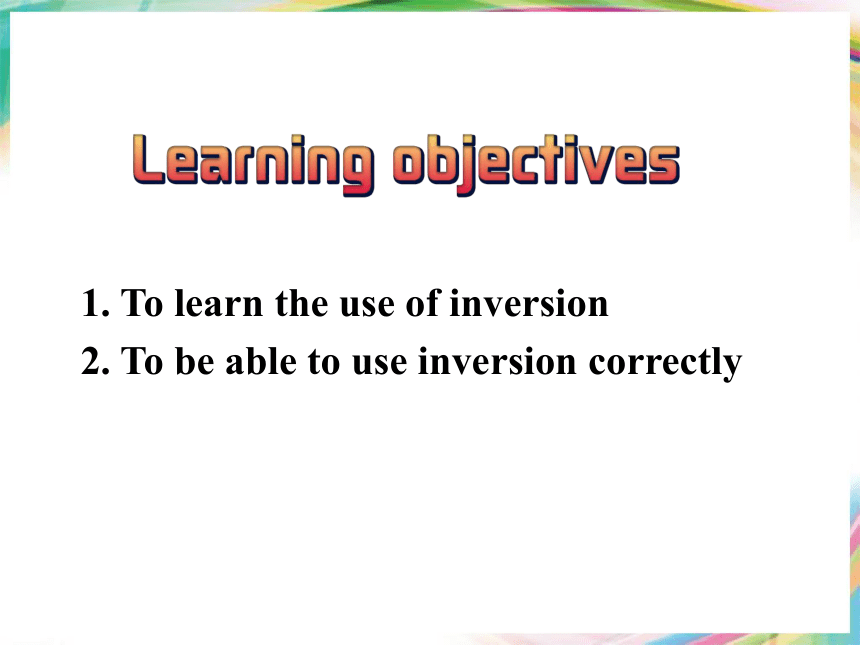
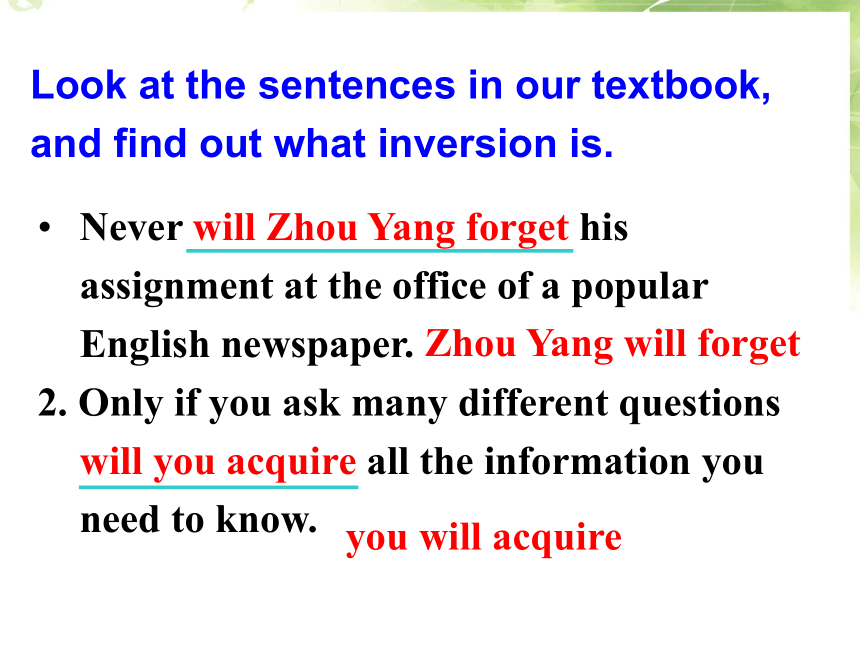
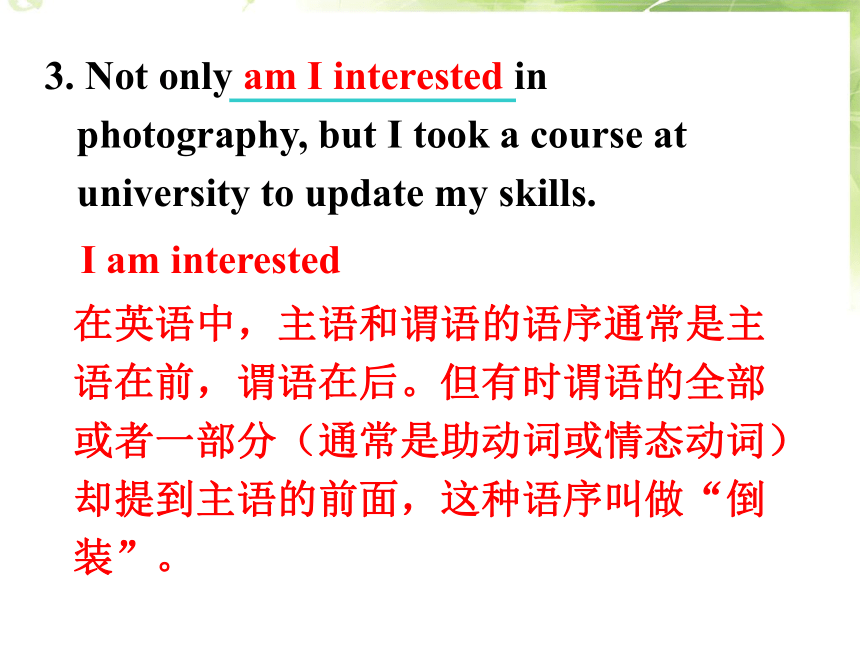
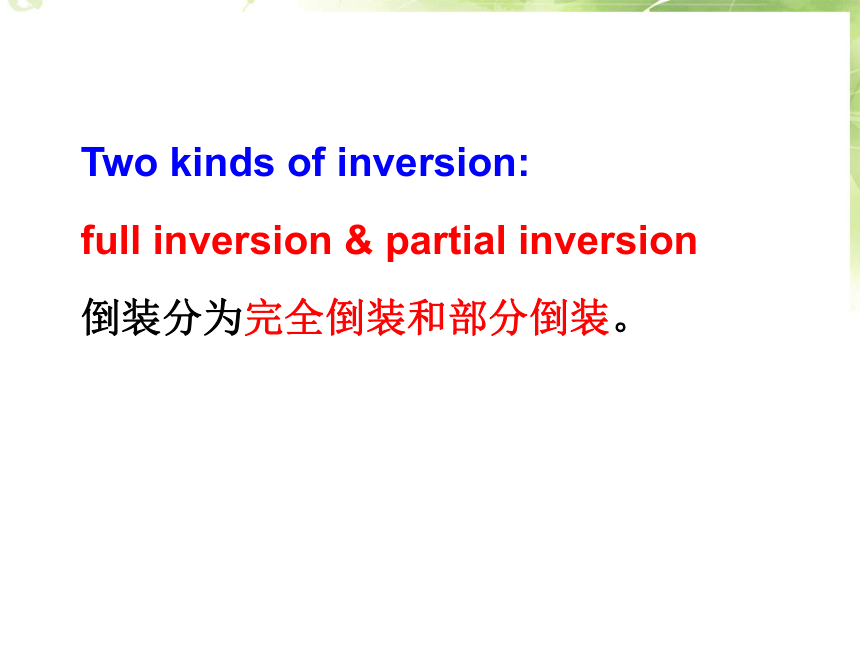
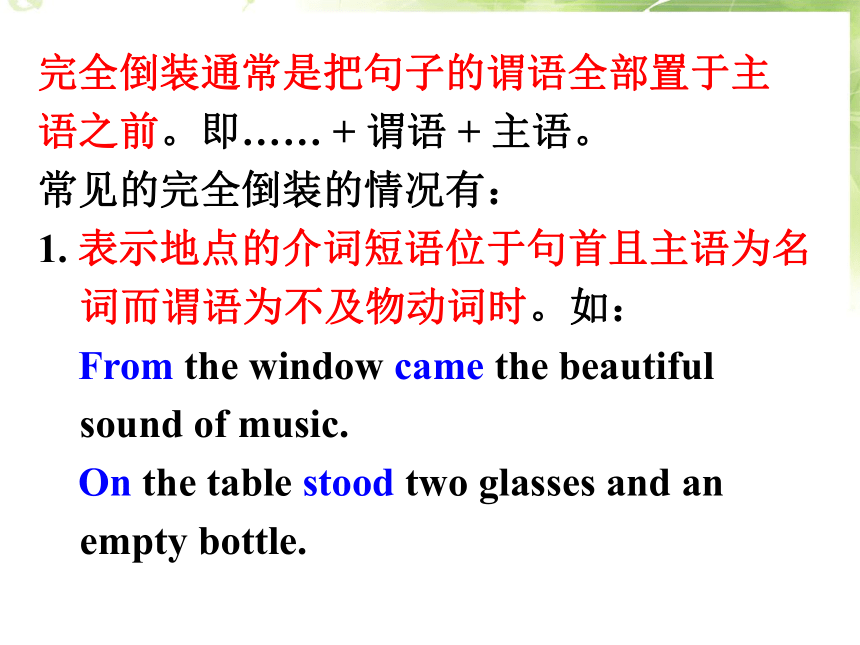
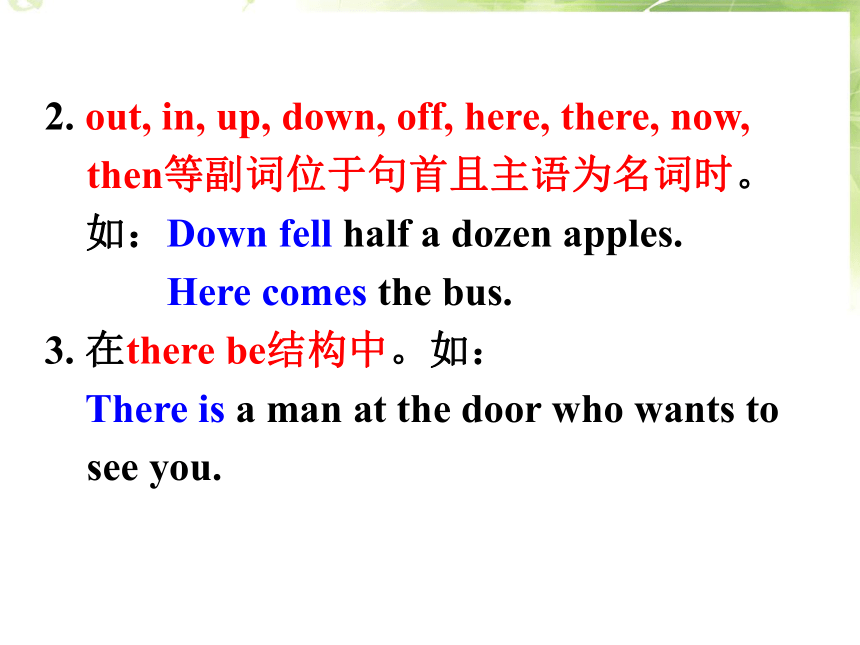
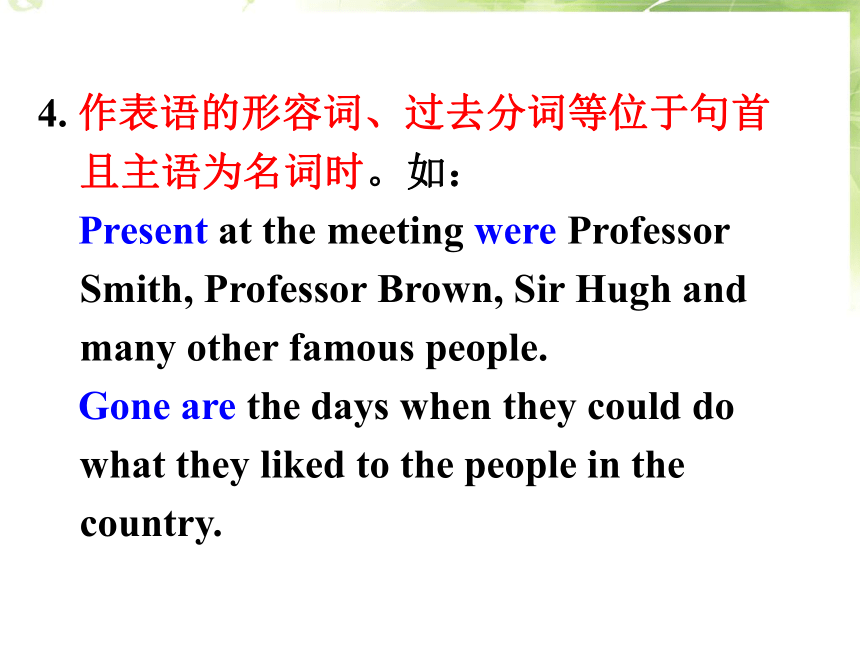
文档简介
(共22张PPT)
Unit
4
Making
the
News
Inversion
1.
To
learn
the
use
of
inversion
2.
To
be
able
to
use
inversion
correctly
Look
at
the
sentences
in
our
textbook,
and
find
out
what
inversion
is.
Never
will
Zhou
Yang
forget
his
assignment
at
the
office
of
a
popular
English
newspaper.
2.
Only
if
you
ask
many
different
questions
will
you
acquire
all
the
information
you
need
to
know.
Zhou
Yang
will
forget
you
will
acquire
3.
Not
only
am
I
interested
in
photography,
but
I
took
a
course
at
university
to
update
my
skills.
I
am
interested
在英语中,主语和谓语的语序通常是主语在前,谓语在后。但有时谓语的全部或者一部分(通常是助动词或情态动词)却提到主语的前面,这种语序叫做“倒装”。
Two
kinds
of
inversion:
full
inversion
&
partial
inversion
倒装分为完全倒装和部分倒装。
完全倒装通常是把句子的谓语全部置于主
语之前。即……
+
谓语
+
主语。
常见的完全倒装的情况有:
1.?表示地点的介词短语位于句首且主语为名词而谓语为不及物动词时。如:
From
the
window
came
the
beautiful
sound
of
music.
On
the
table
stood
two
glasses
and
an
empty
bottle.
2.
out,
in,
up,
down,
off,
here,
there,
now,
then等副词位于句首且主语为名词时。
如:Down
fell
half
a
dozen
apples.
Here
comes
the
bus.
3.?在there
be结构中。如:
There
is
a
man
at
the
door
who
wants
to
see
you.
4.?作表语的形容词、过去分词等位于句首且主语为名词时。如:
Present
at
the
meeting
were
Professor
Smith,
Professor
Brown,
Sir
Hugh
and
many
other
famous
people.
Gone
are
the
days
when
they
could
do
what
they
liked
to
the
people
in
the
country.
Compare
the
sentences.
如果主语是
人称代词
则不用倒装。
二、部分倒装
部分倒装通常是把谓语的一部分(如助动
词或情态动词)提到主语之前。即:
助动
词/情态动词/系动词
+主语
+
谓语剩下的
部分。常见的部分倒装的情况有:
1.?含有否定意义的副词或连词hardly,
never,
not,
little,
seldom,
no
longer,
not
only,
not
until等位于句首时。如:
Hardly
had
he
finished
his
work
when
the
telephone
rang.
Little
did
I
realize
I
would
one
day
be
in
charge
of
the
office.
注意:
①not
only
...
but
(also)
...?连接两个并列分句时,如果not
only位于句首,则前一分句倒装,后一分句仍然用陈述语序。如:
Not
only
did
he
complain
about
the
food,
but
he
(also)
refused
to
pay
for
it.
②not
until后跟状语从句位于句首时,从句不倒装,后面的主句倒装。如:
Not
until
she
spoke
did
I
realize
she
wasn't
English.?
2.
only所修饰的副词、介词短语或状语从句位于句首时。如:
Only
then
did
she
realize
the
stress
he
was
under.
Only
in
this
house
do
I
feel
safe
and
secure.
Only
because
there
were
some
cancelled
bookings
did
he
get
some
tickets
in
the
end.
注意:如果only修饰主语位于句首时,句
子不倒装。如:
Only
a
few
students
got
the
answer
to
this
question
right.
3.
so,
neither,
nor引起的句子,表示前面的情况也适用于另一人(或物)时。如:I
like
singing
and
so
does
Helen.
James
didn't
attend
the
meeting
and
neither
did
Jane.
4.
as引导让步状语从句时。此时常将表语、状语或动词提前,构成倒装。如:
Strange
as
it
may
seem,
the
tallest
boy
is
the
youngest.
Hard
as
he
tried,
he
was
unable
to
make
much
progress.
Try
as
he
might,
he
couldn't
open
the
box.
5.?在so
/
such
...
that结构中,so或such置于句首时。此时so或such所修饰的成分随之前移。如:
So
much
did
he
worry
about
his
sister
that
he
couldn't
sleep
at
night.
Such
a
loud
voice
did
he
speak
in
that
even
people
in
the
next
house
could
hear
him.
注意:
如果谓语动词为be时,则为完全倒装。如:
So
small
was
the
mark
that
I
could
hardly
see
it.
6.?虚拟条件句将if省略时。此时将were
/
had
/
should等提至主语前。如:
Were
it
not
for
their
assistance,
we
wouldn't
be
able
to
do
so
well.
Had
we
got
there
earlier,
we
would
have
caught
the
train.
Should
he
fail
in
the
experiment
this
time,
he
would
try
again.
每空填一词,使每组句子的意思相同或相
近。
1.
The
door
could
not
opened
without
using
force.
Only
by
using
force
________
________
________
________
________.
2.
This
was
the
first
time
the
race
had
been
won
by
a
European
athlete.?
Never
before
________
________
________
________
________
by
a
European
athlete.
could
the
door
be
opened??
had
the
race
been
won
?
3.
A
young
man
stood
in
the
doorway.
In
the
doorway
________
________
________
________.
4.
He
not
only
read
the
book,
but
also
remembered
what
he
had
read.
Not
only
________
________
________
________
________,
he
also
remembered
what
he
had
read.
5.
I
have
seldom
read
an
article
that
was
so
full
of
lies.
Seldom
________
________
________
an
article
that
was
so
full
of
lies.
stood
a
young
man
?
?
did
he
read
the
book
have
I
read
Finish
the
exercises
on
page
29.
Unit
4
Making
the
News
Inversion
1.
To
learn
the
use
of
inversion
2.
To
be
able
to
use
inversion
correctly
Look
at
the
sentences
in
our
textbook,
and
find
out
what
inversion
is.
Never
will
Zhou
Yang
forget
his
assignment
at
the
office
of
a
popular
English
newspaper.
2.
Only
if
you
ask
many
different
questions
will
you
acquire
all
the
information
you
need
to
know.
Zhou
Yang
will
forget
you
will
acquire
3.
Not
only
am
I
interested
in
photography,
but
I
took
a
course
at
university
to
update
my
skills.
I
am
interested
在英语中,主语和谓语的语序通常是主语在前,谓语在后。但有时谓语的全部或者一部分(通常是助动词或情态动词)却提到主语的前面,这种语序叫做“倒装”。
Two
kinds
of
inversion:
full
inversion
&
partial
inversion
倒装分为完全倒装和部分倒装。
完全倒装通常是把句子的谓语全部置于主
语之前。即……
+
谓语
+
主语。
常见的完全倒装的情况有:
1.?表示地点的介词短语位于句首且主语为名词而谓语为不及物动词时。如:
From
the
window
came
the
beautiful
sound
of
music.
On
the
table
stood
two
glasses
and
an
empty
bottle.
2.
out,
in,
up,
down,
off,
here,
there,
now,
then等副词位于句首且主语为名词时。
如:Down
fell
half
a
dozen
apples.
Here
comes
the
bus.
3.?在there
be结构中。如:
There
is
a
man
at
the
door
who
wants
to
see
you.
4.?作表语的形容词、过去分词等位于句首且主语为名词时。如:
Present
at
the
meeting
were
Professor
Smith,
Professor
Brown,
Sir
Hugh
and
many
other
famous
people.
Gone
are
the
days
when
they
could
do
what
they
liked
to
the
people
in
the
country.
Compare
the
sentences.
如果主语是
人称代词
则不用倒装。
二、部分倒装
部分倒装通常是把谓语的一部分(如助动
词或情态动词)提到主语之前。即:
助动
词/情态动词/系动词
+主语
+
谓语剩下的
部分。常见的部分倒装的情况有:
1.?含有否定意义的副词或连词hardly,
never,
not,
little,
seldom,
no
longer,
not
only,
not
until等位于句首时。如:
Hardly
had
he
finished
his
work
when
the
telephone
rang.
Little
did
I
realize
I
would
one
day
be
in
charge
of
the
office.
注意:
①not
only
...
but
(also)
...?连接两个并列分句时,如果not
only位于句首,则前一分句倒装,后一分句仍然用陈述语序。如:
Not
only
did
he
complain
about
the
food,
but
he
(also)
refused
to
pay
for
it.
②not
until后跟状语从句位于句首时,从句不倒装,后面的主句倒装。如:
Not
until
she
spoke
did
I
realize
she
wasn't
English.?
2.
only所修饰的副词、介词短语或状语从句位于句首时。如:
Only
then
did
she
realize
the
stress
he
was
under.
Only
in
this
house
do
I
feel
safe
and
secure.
Only
because
there
were
some
cancelled
bookings
did
he
get
some
tickets
in
the
end.
注意:如果only修饰主语位于句首时,句
子不倒装。如:
Only
a
few
students
got
the
answer
to
this
question
right.
3.
so,
neither,
nor引起的句子,表示前面的情况也适用于另一人(或物)时。如:I
like
singing
and
so
does
Helen.
James
didn't
attend
the
meeting
and
neither
did
Jane.
4.
as引导让步状语从句时。此时常将表语、状语或动词提前,构成倒装。如:
Strange
as
it
may
seem,
the
tallest
boy
is
the
youngest.
Hard
as
he
tried,
he
was
unable
to
make
much
progress.
Try
as
he
might,
he
couldn't
open
the
box.
5.?在so
/
such
...
that结构中,so或such置于句首时。此时so或such所修饰的成分随之前移。如:
So
much
did
he
worry
about
his
sister
that
he
couldn't
sleep
at
night.
Such
a
loud
voice
did
he
speak
in
that
even
people
in
the
next
house
could
hear
him.
注意:
如果谓语动词为be时,则为完全倒装。如:
So
small
was
the
mark
that
I
could
hardly
see
it.
6.?虚拟条件句将if省略时。此时将were
/
had
/
should等提至主语前。如:
Were
it
not
for
their
assistance,
we
wouldn't
be
able
to
do
so
well.
Had
we
got
there
earlier,
we
would
have
caught
the
train.
Should
he
fail
in
the
experiment
this
time,
he
would
try
again.
每空填一词,使每组句子的意思相同或相
近。
1.
The
door
could
not
opened
without
using
force.
Only
by
using
force
________
________
________
________
________.
2.
This
was
the
first
time
the
race
had
been
won
by
a
European
athlete.?
Never
before
________
________
________
________
________
by
a
European
athlete.
could
the
door
be
opened??
had
the
race
been
won
?
3.
A
young
man
stood
in
the
doorway.
In
the
doorway
________
________
________
________.
4.
He
not
only
read
the
book,
but
also
remembered
what
he
had
read.
Not
only
________
________
________
________
________,
he
also
remembered
what
he
had
read.
5.
I
have
seldom
read
an
article
that
was
so
full
of
lies.
Seldom
________
________
________
an
article
that
was
so
full
of
lies.
stood
a
young
man
?
?
did
he
read
the
book
have
I
read
Finish
the
exercises
on
page
29.
